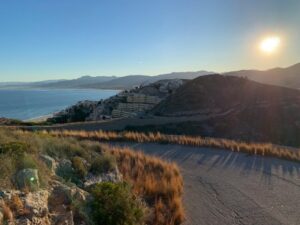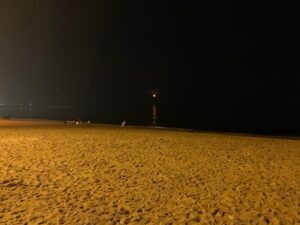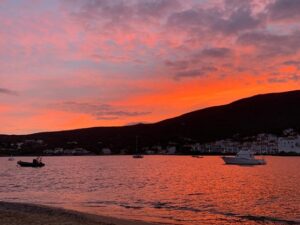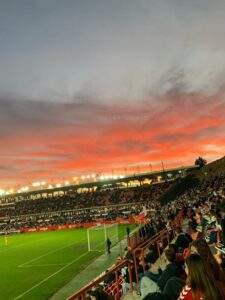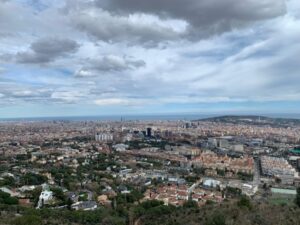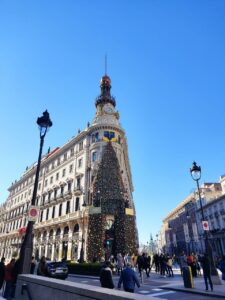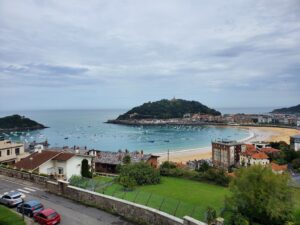Kategorie: ‘Host Country’
Internship in Bilbao
- Business Administration and Engineering: Mechanical Engineering M.Sc.
- Spain, Bilbao
- FEV Consulting Iberia
- 10/23 – 02/24
Application/Finding an internship
I started the internship search for an internship in Spain very early (about 5 months before the start of the internship), as it is advisable to expect sufficient lead time for applications
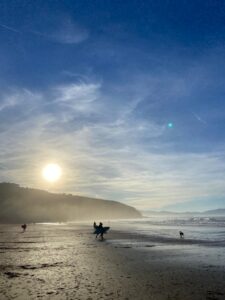
© Johann von Harling
Surfing beach in Sopelana
for internships abroad. I narrowed down the internship search to Spain because I am very interested in this country and also wanted to deepen my language skills. My approach to the application process involved systematically identifying companies in my area of specialization through internet research and searching for internship openings in the Career section of each website. Additionally, I also sent spontaneous applications to smaller companies. With larger companies, there is a greater likelihood that English is required or accepted as a working language. Many companies require foreign interns to complete the internship for longer than 6 months due to tax benefits, which limited my application to numerous companies. In the end, I found a German company with a location in Spain (Bilbao), which operates internationally in the field of technology consulting for the automotive industry and other technology sectors. I applied and had to go through the traditional application process for an internship in management consulting, consisting of two rounds of application involving interviews and solving a case.
Accomodation & Living expenses
For accommodation, I would recommend starting to look for apartments/rooms very early as well. Bilbao is one of the most expensive cities in Spain alongside Madrid and San Sebastian. Prices are generally comparable to those in German student cities, but they can also quickly rise to €600 or €700 for a shared room. However, it is also possible to find some very affordable rooms for around €300 with lower living standards.
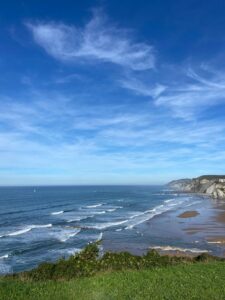
© Johann von Harling
Cost near by Bilbao
When viewing apartments, it is important to ensure that the windows are reasonably insulated for winter stays, and in summer, having air conditioning in the apartment may be necessary. When I arrived in Bilbao in October, the first few days were still very warm, with temperatures reaching up to 35°C. However, temperatures in winter also drop to very low values of around 0°C to 10°C, so having heating and well-insulated windows can contribute to comfort. Many students in Bilbao live in neighborhoods like Indautxu, Deusto, or Casco Viejo. However, there are apartments scattered throughout the city. Idealista is highly recommended as a portal for apartment hunting in Spain. Alternatively, you can also search for real estate agencies online. Bilbao is a relatively modern city for Spain, with many high buildings. On the other hand, it also has a beautiful old town area in Casco Viejo. The average living costs are quite comparable to the living costs in Germany although visits in restaurants and bars can be significantly cheaper from time to time. Prices in supermarkets are very much the same as in Germany, but the costs of a visit in bar or a restaurant can be regarding the restaurant a lot cheaper. It is also recognizable that Bilbao has one of the highest densities of Michelin Star restaurants in Spain and if you like you can as well try out the excellent cuisine.
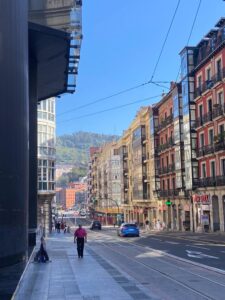
© Johann von Harling
Bilbao offering excellent transportation options with tram, metro, bus and train
Everyday life/ the internship
I completed the internship full-time, mainly in the office in downtown Bilbao. The atmosphere within the international team was very professional yet friendly outside of working hours. The predominant language in the company was English due to international projects. However, the conversation would also occasionally switch to Spanish or German, which I enjoyed and which contributed to improving my language skills in several languages. The internship involved working on technical projects, which were well-suited to the knowledge gained from studying industrial engineering. Projects in the field of electromobility, artificial intelligence, and general automotive production were the focus. The working hours for a consultancy were mostly between 8:30 am and 7:30 pm, which included most times a lunch break of half an hour to one hour, where we sat together with all the employees. Usually in the week most time was spent at the office and free time afterwards in walks around the various streets in the city and weekends were used to do bigger journeys and small trips within the near of Bilbao or other cites in Spain.
Free time/tips
Leisure time in Spain, especially in Bilbao, can be very diverse depending on the season. During the warm autumn days, trips for hiking, relaxing, swimming, and surfing along the coast of Bilbao are highly recommended. With the metro, you can reach the vicinity of the beach for €1.50 within 30 minutes and then reach it on foot after a short hike (15-20 minutes). The coastline consists of steep cliffs and long beaches. Additionally, you can also utilize the surrounding mountains near Bilbao on weekends for short hikes to get a view over the entire region. Bilbao is located in northern Spain, and there are many noteworthy cities nearby such as Santander, San Sebastian, Pamplona, Zaragoza, or even Madrid. The Cantabrian and Basque regions, in general, are highly recommended for excursions. A recommendation to create more leisure time during the internship is to strategically choose vacation days to have long weekends, allowing for short trips to more distant cities like Barcelona, etc.
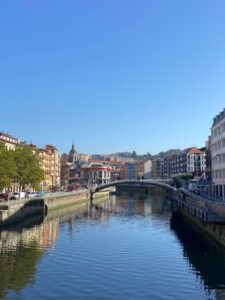
© Johann von Harling
Bilbao city quarters seperated by river
A recommendation for Bilbao is to explore the culinary diversity of Spanish specialties offered in many small local eateries. There is a rich culture of pintxos (tapas) available at many times of the day. Furthermore, Bilbao offers a lot of culture with the world-famous Guggenheim Museum or the football matches of the renowned Spanish football club Atletico Bilbao, which take place in the San Mames Stadium. I really enjoyed the internship because during that time, occasional team events were organized in which employees could participate, happening on weekends or after work. For example, there was the Bilbao Marathon, in which we could participate in various distances such as 10 km, half marathon, or marathon. During this race, the entire city was closed off for one evening, with about 13,000 people participating and many thousands more cheering on the streets of Bilbao.
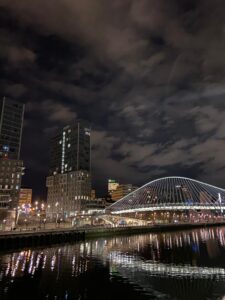
© Johann von Harling
Bilbao with modern buildings in the city center
Conclusion
An international internship is recommended for students who want to improve their language skills in a language other than their native language, are interested in new cultures, and at the same time want to experience the working style in another country within a company. Living abroad provides a different perspective on many things and broadens one’s horizons. The internship offers a very good opportunity to combine the interest in international experience with the interest in professional experience. In addition to the internship, you have the opportunity to explore new cities, different places, and another culture. Spaniards exude joy of life, which is recognizable in many everyday situations. Next to working, I really enjoyed the trips we organized either with working colleagues or with friends, where we could further explore the great cities and landscapes of Spain and discover even more how diverse this country is.
I am very glad, that I had this opportunity supported by Erasmus Internship, that offered me to experience the work culture as well as the live and culture in a different country. I hope that many people will also have this opportunity and support to experience such great possibilities.
Internship in Brussels
- Architecture B.Sc.
- Belgium, Brussels
- BC Architects
- 10/23 – 03/24
The past six months I have lived in Brussels to complete an internship at an architectural office. My decision to temporarily move here had nothing to do with the city or the country though but the specific office I would like to work at: an office focusing on sustainable architecture and earth construction. In July I had a job interview after which I was accepted quite quickly. However, there was not enough time to apply for a full Erasmus scholarship in time. Therefore, I strongly recommend everyone to get all the documents ready as soon as possible.
The hunt for an apartment or flat share went quite easily. I checked on the website „appartager“, finding lots of offers, but I was trying to look for a room in the areas of
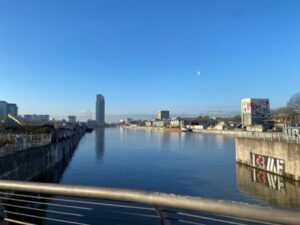
© Lea Knoch
Ixelles, St Gilles and Schaerbeek (a friend of mine recommended). I ended up in Schaerbeek, in a flat share of four people with a very friendly land lady. The location was perfect, just ten minutes from work on the bike. Since all the rooms were free, I did not know who the other flat mates will be… in the end we were all Germans.. At first we were a bit disappointed, since we would have loved a more multicultural experience but soon we discovered that we were super happy to have a little „German home“ far from home. Whether we discussed the pros and cons of German or Belgium beer or the joint hunt for the best bakery in the city (the truth: nothing can replace German bread) we had a really good time together. We spent lots of nights sitting in the kitchen, chatting, cooking or strolling through the city. In the end we became really good friends, I hope to see again at some point. Our favourite activities contained: visiting Schleiper (the place to go as a creative person, 4 stories full of paint, brushes, paper, materials, clay…) visiting (flea) markets in the Marolles and at Gare du Midi and reading books in cafes or bars. Since it feels like its always raining in Brussels, it is important to know nice places you can hide in when it starts pouring.
The city itself is not too big but feels very confusing at times. Brussels undergoes lots of changes at the moment, many architectural and urban developments are happening. Therefore, construction sites everywhere. Plus there really is a thing called „Belgian solutions“, creative ways of finding solutions to problems (sometimes not making sense) and very much in contrast to German solutions.
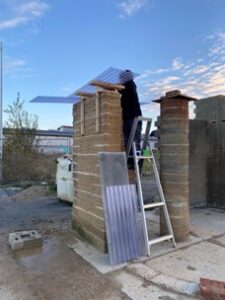
© Lea Knoch
So, unexpected things to happen everywhere and endless opportunities to explore. Although the tram system is super modern, it takes ages to move within the city if you rely on this type of transportation. Having or renting a bike is definitely the easiest way to travel around and most of the times I felt quite safe cycling in the streets.
But be aware, Brussels has some hills, so a workout is included. The neighbourhood I lived in, Schaerbeek, is a very multicultural and multinational area. The Moroccan and Turkish communities are quite large and it was reflected in the streets: lots of mini markets with stacks of fresh vegetables and fruits outside and bakeries with delicious baklava run by some of the friendliest people I have met in the city. Though I did feel like the neighbourhood is also changing, the process of gentrification has definitely started..
My internship started on the 11th of September. When I arrived I was welcomed by my supervisor and a colleague and they gave me a short tour of the office and introduced me to everyone. In the beginning I was quite overwhelmed, thinking I would never be able to remember all the names and finding my way around (although it was not too big, around 30 people working there). The first days I spent reading lots of documents and plans to get an idea of the project I was working on but quite quickly I started working on it. Three weeks later another architect joined the team for it and I very much enjoyed working with them. I was able to work on different things, designing,
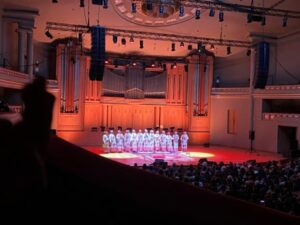
© Lea Knoch
drawing plans, making models and repairing the roof of a prototype pavilion on the site. The atmosphere in the office was incredible, I never wished to be anywhere else. Everyone was super friendly, open and funny. I was also impressed that everybody got along with each other (not always like that with 30 people) and what also contributes this, I think, is the way they create lunch breaks at the office. Since the office is located near the canal of Brussels, a rather industrial area, with not many food places around (plus it it super expensive to eat out in Brussels), they created a system in which every day one person of the office cooks a meals for everybody and at lunch we sat together in the kitchen sharing the food. This way we got a nice, healthy and freshly cooked meal every day plus the opportunity to chat with everyone. Additionally, I can now claim I am able to cook a nice meal for around 25 people within two hours, a skill I never thought I would ever need nor gain!
Unfortunately, my language skills did not improve as much as I had hoped. Although I had four years of French lessons at school I did not remember a thing when I arrived. Since the people working at the office came from different countries, English was the main language to communicate within the office. Most meetings with clients were held in (Dutch or) French. I would say I am now able to understand conversations and read texts but I do not feel very comfortable talking and expressing myself in French. In the beginning I thought about joining a French class in the evening but working full time and more was already tiring and exciting enough. For the future I hope to be able to expand my knowledge since it is an beautiful language and spoken in many countries I am interested in visiting.
The overall experience at the office, at home and the city was very nice. Brussels is an open and divers city and offers activities, adventures and culture for everyone. I can only recommend!
Internship in Dublin
- BA Teacher Training for Secondary and Comprehensive Schools (English and History)
- Dublin, Ireland
- UNICEF Ireland
- 10/23 – 12/23
Internship Search / Application
I started looking for possible internships more than half a year before my planned stay abroad. Since I had completed my undergraduate degree, I thought I’d look for an internship at a school in Dublin, as it would be valuable experience as an aspiring teacher. Unfortunately, I received little to no response from the schools I contacted. So, I started looking for internship opportunities with well-known companies and organizations. I stumbled upon an unrelated job posting at UNICEF Ireland and got the idea to reach out and ask for an internship opportunity since there weren’t any current internships listed on their website. The UNICEF Head of Advocacy, who would later become my supervisor, responded to my inquiry and made it possible for me to intern at the UNICEF Ireland office in Dublin. While it did take long to find an internship, I’m glad I stayed consistent with my search and found an opportunity I knew I’d enjoy.
Accommodation & Living
Since I was interning at an office, I had to look for a place by myself. Finding accommodation in Ireland, and specifically in its capital, was a struggle. I wasn’t able to find anything suitable prior to my stay, as Ireland is currently dealing with a housing crisis, as well as due to my personal preferences. However, I did get a reply on the main property offerings website of Ireland and ended up arranging a video chat with a landlady. While the accommodation wasn’t a perfect fit due to time circumstances, the possibility to contact the landlady by phone was what ultimately helped me find a place in Dublin. I flew to Dublin a week before the scheduled stay with a parent, looked around, and viewed a couple of one-bedroom flats. I decided to call the landlady I had video chatted with and ask if there were any flats available. Thankfully, I received a positive answer and viewed the place within the same day. I rented a one-bedroom flat in a safe and quiet neighborhood south of Dublin. The rent in Ireland is extremely high and at times as high as 1600 Euros per month for my small room.
Everyday life / The internship
Some weeks during my stay abroad were monotonous, others were quite different and spontaneous. I got to attend different events and meetings for my internship, like the annual UNICEF charity lunch, which was a fancy lunch with many people from respectable companies who donate large amounts to causes through UNICEF. This was a different environment for me to be in and I was grateful for being invited despite being new to the office. Moreover, I spontaneously had to attend a conference by myself where I met lovely people with whom I got to spend time with at other charity events.
My main task during my internship was to help organize a workshop for teens on activism. I helped organize three workshops, two online and one in person. The online workshops lasted a week each, while the in-person workshops lasted just one day. I enjoyed being a part of something active and doing the work behind the scenes. This experience was highly beneficial for my degree as well because I got to speak in front of groups of teens and lead some of the activities from the workshop, something I will have to do on a daily basis in a few years.
Getting around and riding the bus was easy and cheap in comparison to Germany. The UNICEF office was a pleasant 20-minunte bus ride from the bus stop in front of my apartment building. In the office I was confronted with a yet very present work-from-home culture. Every day there were different group of people present. The space itself would not be able to handle the presence of all employees as it was relatively small with limited workspace, which was not what I expected from an office for an important organization like UNICEF. Nevertheless, it seemed to be just quite right for the staff. I was happy to be accompanied by another intern, with whom I occasionally spent my free time as well. In general, the people in the office are welcoming and interesting. It was definitely a pleasure to work alongside them.
My supervisor worked from home, so when I got to the office, I mostly worked on my own. I tried to be consistently in office everyday but later came to realize that there was no actual need to be at the office since everything was done on a computer anyway. Still, three days of the week I was at the office, the other two days I worked at the library. However, I participated in the online workshops from home.
Aside from helping to create the workshop, I was also involved in the Child Rights Schools project, an initiative that encourages schools to receive a banner from UNICEF that identifies their school as child rights recognizing schools. I attended a couple of meetings where I got to make a few small decisions and got to visit a Child Rights School in Dublin as well. It was fascinating to see and learn about other school systems, which helped me evaluate and compare the Irish school to German schools, seeing where the respective negatives and positive aspects are and to possibly apply the positive in a correct given situation.
Free time / Tips
Since I had a flexible daily schedule, I took advantage of it and explored Dublin bit by bit. Ireland’s capital is separated by the river Liffey. North Dublin is considered to be the poorer part, while the south is visually different and is home to Ireland’s most important government buildings. Dublin is also a very walkable city as well and has many beautiful parks. I especially enjoyed going for a stroll at sunset at the park that was just two minutes from my flat. Moreover, I found it fascinating to be so close to the sea. I enjoyed going on day trips to Howth, Bray and Greystones. The train ride is just half an hour, and the view is just terrific as the train passes by the sea. I recommend getting a Youth bus / train card, which allows you to travel around at a cheap price compared to the visitor’s card.
Moreover, I enjoyed exploring the city at my own pace, especially during the holiday spirit, and planning spontaneous outings. In terms of getting to know new people, got to know some interesting people at the charity events I attended and definitely made same life-long friends.
Conclusion
All in all, my three months spent abroad haven been unforgettable experience for me. Ireland is a great country to take your first independent steps in, as it is familiar enough like any other EU country but, of course, a new place to make great new memories. I was filled with a new energy from the friendly Irish people, which made my stay even more enjoyable than I had hoped. Despite the high rent, I can definitely see myself returning for work or further study or even just for a nice little summer stay, just to enjoy the sea with a bit more sun and less wind.
Internship in Sweden
- Energy Engineering M.Sc.
- Sweden, Tranas
- Bosch Thermoteknik AB
- 09/2023 – 03/2024
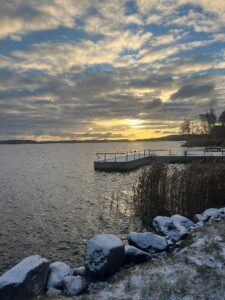
© Anna Bley
Internship Search:
When I was on the hunt for an internship abroad, I turned to LinkedIn to check out job listings in countries and cities I was interested in. It was a pretty straightforward way to find some cool opportunities. I also spent some time browsing through the websites of companies I liked, hoping to stumble upon any international gigs. That’s how I came across an internship listing for Sweden on one company’s site, and I wasted no time in applying. Both methods worked out pretty well for me, so I’d definitely recommend giving them a shot to widen your search.
Accommodation & Living:
During my internship, I ended up in Tranås, a cozy town in Sweden’s Jönköping province. The company sorted out our living arrangements in a wing of a golf hotel, which was a short drive from where we worked. Each of us had our own room, fully furnished with everything we needed, and we shared common areas like the kitchen and living room. The hotel also had some cool extras like laundry facilities, a gym, and even a sauna. Plus, it was right by Lake Sommen, which was perfect for relaxing after work.
Getting around was a breeze too, thanks to the company providing us with three cars to use. They covered all the costs, which made things a lot easier. Having accommodation sorted out by the company made settling in a lot smoother, and with 13 of us from different parts of the world, it was easy to make friends and feel at home.
Everyday Life/Internship Experience:
Swedes are really good at English, so communicating with everyone was no problem at all. But they definitely appreciate it when you make an effort to speak a bit of Swedish too. I used Duolingo to learn some basics, and it definitely helped me feel more connected.

© Anna Bley
Starting a new job in Sweden means getting into the Fika tradition, where you take breaks with your team for coffee and snacks. It’s a great way to bond and chat about stuff. The office vibe is pretty relaxed too – even the big bosses wear jeans and T-shirts to meetings.
When it comes to work, everyone’s pretty chill and informal. It’s all about working together as a team, and everyone’s opinion matters, no matter their position. I was pleasantly surprised by how much my input was valued as an intern. The work culture is all about trust and giving people the freedom to do their thing. Swedes take a lot of pride in their work and love showing off their company logos.
Free Time/Tips:
Getting outdoors is a big thing in Sweden, no matter what time of year it is. Thanks to the Right of Public Access, you can explore nature, pick berries, and even camp out pretty much anywhere (as long as you’re respectful). Camping around Lake Vättern is a must-do, with plenty of shelters and awesome trails to check out.

© Anna Bley
Weekends are perfect for exploring nearby towns like Gränna and Eksjö, or even bigger cities like Linköping and Jönköping. And if you’re up for it, why not take a trip to Gothenburg or Stockholm? Both cities are just a few hours away by train and totally worth it. Gothenburg, especially around Christmas time, is super charming and definitely worth a visit.
And don’t leave Sweden without going on an elk safari – it’s a blast! We booked one near Eksjö in December, and it was so much fun. If you can, try to go during the winter when everything’s covered in snow – it makes the whole experience even more magical.
The best part of my time in Sweden was the trip to Swedish Lapland. We stayed at Camp Alta near Kiruna and did all sorts of cool stuff like snowmobiling and seeing the Northern Lights. Even though it was freezing cold, it was an experience I’ll never forget.
Conclusion:
Sweden has something for everyone, whether you’re into winter sports or just chilling out in nature. The work culture is super relaxed, and people are really friendly and welcoming. Whether you’re grabbing a coffee with your team or exploring the great outdoors, Sweden is the perfect place for an internship adventure.
Research Internship in Tarragona
- Chemistry M.Sc.
- Spain, Tarragona
- Institut Català d’Investigació Química
- 10/2023 – 02/2024
1. Application/Finding an internship
Before I applied for the research internship I did not have a clear idea which place to go. During the course of the chemistry master in Aachen it is necessary to do two to three research internships and I knew that I wanted to do one of them abroad. So, I asked the supervisor of my bachelor thesis whether he can recommend me some places to go. He directed me to a professor at the ICIQ in Tarragona which is a non-university research institute, perhaps comparable to the Max-Planck institutes and the likes in Germany. From looking at the group’s website I found the chemistry interesting and so I sent an e-mail with an application to the professor at ICIQ. He replied that he would be happy to host me, so we filled the required paperwork for the Erasmus internship.
2. Accommodation & Living expenses
When dealing with the bureaucracy of the stay, a secretary of ICIQ offered me a studio apartment of ca. 20 sqm total to rent. Despite its small size it was outfitted with everything one needs, like an oven, stove, refrigerator and washing machine. The biggest drawback was that I did not have a real bed but slept on a sofa bed instead. Looking back now I should have looked for a flat myself to first meet people outside of work and second because it was quite expensive (650 € per month), thereby consuming almost the entire Erasmus scholarship. There are cheaper options in Tarragona even though it was located in part alta, which is the historic centrum of the city. Travelling to Tarragona from Germany by ‘green’ means is relatively easy. There is a direct Flixbus connection from Cologne to Barcelona, taking about 18 h. This has the advantage that one piece of luggage is already included and more can be bought for 5 € a piece. From Barcelona it is only a short train ride to reach Tarragona. As far as I know there are no student dormitories like in Germany in Spain or they exist to a much smaller extent. Moreover, it is more common to continue living with one’s parents while studying so there is not something like a student quarter in the city.
Living in the historic center of the city has the advantage of being close to the historic landmarks of Tarragona, the cafes and restaurants as well as many cultural events such as the carnival celebrations. On the flipside the ICIQ is located on the outskirts of the city. Because of this, the walking distance to work was almost half an hour each way. Apart from the cost of the studio, I would say the living expenses are quite similar to Germany. Groceries are roughly the same price, but I really enjoyed the Spanish vegetables quality. I recommend to get a Spanish SIM card as the services are much cheaper than in Germany. There was no WiFi in my flat but I got 100 GB of prepaid mobile data for 20 € a month so I just used my phone’s hotspot for accessing the internet from other devices. If one has a Spanish bank account and is therefore eligible to get a plan it can be even cheaper.
However, I spent more money per month than I usually do because I went out much more. In my experience the culture in Spain is very different in that regard to Germany. I rarely met up with people at one’s home as you would do in Germany. Instead we went to the many, always well filled cafes and restaurants, for example to have some olives and vermouth in the afternoon. I spend a lot of time with my colleagues who were very welcoming and generally super nice people.
3. Everyday life/The internship
On a typical day I would wake up at around 8 am, have breakfast and then walk to the institute, so I would arrive around 9 am, if there were no meetings with the group or presentations scheduled earlier. We had one weekly group meeting in which several members of the group had to present their recent work which was then discussed among the group. Moreover, further regular group activities included literature, in which someone from the group presents a recent paper and subsequently leads the discussion in the group, topic, a more extensive version of literature where the basics of the specific niche are also explained and problem session. In this activity a member of the group prepares a total synthesis, removes some of the information like the products and/or conditions of the individual reactions and the group then has to figure out the synthesis and the mechanisms of the separate steps. I think most of these activities are pretty standard in academic groups in chemistry.
Apart from this we had subgroup meetings every three weeks to discuss our results and what needs to be done in the future more personally with the professor. The majority of my time in the institute I spent doing chemistry and trying to make the things work we talked about in subgroup meetings. In general, I had a lot of freedom after being put on one of the group’s project in the beginning in regard to which things I wanted to achieve and the methods used to get there within this project, which I really liked. I always felt like my opinion was valued and respected and there was a great sense of equality within the group. I never had the feeling that some of the PhD students or Post-Docs looked down on me or automatically valued my opinion less because I am a master student, which in my experience cannot be taken for granted.
The same applies to the use of the group’s and institute’s equipment. Everyone had the same rights in the access to it. Both the group and institute have great equipment. For example, the supply with glass-ware and technical equipment like GCs, LC-MS, GC-MS, glove-boxes etc. in the group is excellent. The institute shares more equipment like several NMR machines, which almost always made for very quick measurement times. Also, the institute hosts a whole analytics department, where one can submit among others HRMS and X-ray samples. In addition, there is a HPLC unit which can separate small quantities of sample for you. The digital equipment is very modern as well. There is a well-working chemical inventory for the single work groups and the institute as a whole. Everyone uses a digital lab journal to track their experiments, making it very easy to share results and procedures with colleagues. Though, because I am a master student, I was not provided with a PC at work and had to bring my own laptop every day.
Since there were many people in my group, I had to share my fume hood for the last one and a half months of my stay. Because the fume hoods are big this was not too much of an issue. The laboratories are quite large, in my group there were seven to ten people in one lab. Unfortunately, the ICIQ currently does not have canteen. There is one at the nearby campus of the university URV but it is not comparable to the mensa in Aachen. Prices are generally much higher (comparable to the prices for external people in mensa) and most days there are little to no vegetarian options. Because of this almost everyone brings their own food to work every day, so I had my lunch in the break room with my colleagues most days.
Most days I stayed in the laboratory until between 6 to 8 pm. On weekdays the institute is opened from 7 am to 10 pm and Saturdays from 7 am to 5 pm while it is closed on Sundays. I only worked on Saturdays on exception and I want to highlight that I worked these relatively long hours because of my own choosing as I really liked the chemistry I was doing and wanted to make progress. Nobody put on any pressure on me to work as much as I did and when I wanted a few vacation days it never posed any problem. Same as with the exact contents of my research I enjoyed a lot of freedom in my working hours. If one wants to have a more time off during an internship it is definitely possible.
In the beginning of my stay I had to undergo a lot of safety instructions like written tests, a presentation and a walk through the institute. I was provided by the institute with two lab coats and safety glasses. About one month into my stay I got into a laboratory accident were a splash of DCM entered my eye. Luckily, my lab colleagues were quick to aid me and washed my eye first with a special solution intended for these purposes and then water. They also alarmed the institution’s security department. A worker of this department then continued to wash my eye with salt water before taking me and a Spanish-speaking coworker to the hospital, where an ophthalmologist checked my eye for lasting damage. Luckily, there was no such damage and I was prescribed antibacterial eye drops. Nevertheless, my eye got infected because of the irritation caused by the DCM and I had to go to the hospital two more times during the next week. In the end it healed perfectly fine and I have no damage in my eye. The insurance of the institute handled everything with the hospital great so it was not stressful for me in that regard and I am very grateful to the lab mates and ICIQ employees who helped me.
The language of my stay was English as my group was very international, with only about 25 % of the group members being Spanish. Therefore, all communication within the group was in English. I do not know whether my language skills got better during the stay as I like to think that I was quite proficient before. Before the internship I also studied Spanish in university for a semester and longer in private. Unfortunately, I do not believe that it got much better during the stay. First of all, as discussed before I did not use it at work and second in my experience many people outside of work preferred to speak Catalan instead of Spanish (which are two different languages) as Tarragona is located in Catalonia. When they noticed I did not speak Catalan many switched to English right away. This meant I spoke very little Spanish during my stay.
Possibly because of the group’s internationality many group members do not know too many folks outside of work in the city, so we spend a lot of time outside of work together. Big cultural events like Christmas were also celebrated in the institute with the Catalan traditions or within the group. For example, we went to a fire place to do Calçotada with the group. In this tradition spring onions are burned in a fire. The outer layers are removed and the spring onion is eaten whole with a special sauce. I much appreciate that I got to experience these traditions.
4. Free time/Tips
A great way to spend part of the weekend is to support the local football club Gimnàstic de Tarragona (often abbreviated to Nàstic) in their fight for promotion to the second Spanish league. Usually about 5.000 to 10.000 people visit their games, creating a vibrant atmosphere, even though it cannot quite compete with Alemannia Aachen ;). Tarragona used to be an important roman city (named Tarraco), as it was their first permanent settlement on the Iberian Peninsula. Since the city’s population remained smaller than at its peak height in roman times until well into the 19th century a lot of the roman architecture is still standing today. The amphitheater located directly at the beach for example is part of the UNESCO world heritage. It is among six attractions from antique times and the middle ages which can be visited with a bundled pass for 15 €, an investment that is well worth its money. The surroundings of Tarragona also feature nice nature and hiking paths to explore it. For example, I once hiked to the roman aqueduct which is located 4 km outside of the city and its impressive to imagine that it has stood there for 2.000 years.
If you like climbing there is also a famous rock climbing area outside of the nearby city of Reus. Reus and Tarragona have kind of a rivalry going on as they are by far the biggest cities in the area. Reus can be reached by a regular bus service from Tarragona in about 30 minutes. I often went there as there unfortunately is no climbing gym in Tarragona but there is an excellent one in Reus I can recommend. Apart from this the city of Reus is surely worth a visit on its own. In the Christmas time there are nice markets where once can buy artisanal foods or typical Christmas accessories of the region like a Caga tió or the Caganers. Most smaller cities around Tarragona can also be reached by bus services. In addition, Barcelona is connected by rail to Tarragona. The ride takes 1 h 15 min to 1 h 45 min, depending on the train, allowing for many weekend trips. Supporting this is a current promotion of the Catalan railways in which one can buy an indefinite use ticket for four months for a specific route for only 20 €. If within this timespan one uses it at least 16 times, you even get the 20 € back! Tarragona possesses a separate high-speed train station on the route Barcelona-Madrid as well. This station is located 8 km outside the city, so it is connected to the city center by bus. From there, travelling to Madrid takes only two hours and connects to the whole Spanish high-speed rail grid.
Furthermore, Tarragona is located on the Mediterranean Sea and has some beautiful sand beaches alternating with small cliffs, so I often enjoyed taking evening walks along the coastline. Up until the middle of November the water was also still warm enough for me to enjoy swimming in the sea. Many people possess beach volleyball sets, so during the summer the beach is filled with beach volleyball courts. Obviously during the winter, the weather is much better than in Germany. The temperature rarely dropped below 10 °C and sometimes exceeded 20 °C in February, enabling outdoor activities year-round. Once a week I played football on a pitch belonging to a nearby school with a group of students and workers of the ICIQ and the nearby university URV.
Before I mentioned that I went out a lot for food and drinks. As a vegetarian I would say it is a little harder than in Germany when eating out. When going out for Tapas there are usually enough vegetarian options (at some places you might have to order every available one to get fed) but otherwise one can sometimes be somewhat restricted to only one to three dishes to choose from in total. In the worst case, almost every place offers Patatas Bravas, so one can reliably fall back on that. Vegan options however can be much direr, so you should check beforehand if there is something available for you. When cooking for myself though I found myself in paradise. The vegetable quality and variety available is amazing so vegetarian or vegan cooking is a blast.
5. Conclusion
Looking back, I had a great time in Tarragona. The people I met were super nice and welcoming. I hope that I have made some lasting friendships. Also, I experienced some Catalan culture, like carnival, the Christmas traditions or Calçotada. In and around Tarragona there are many cool options to spend one’s leisure time. Regarding the work I experienced a lot of freedoms and I found the chemistry I did super interesting. I also really liked the culture and atmosphere at ICIQ. Therefore, I can wholeheartedly recommend a stay in Tarragona and I will definitely come back either for vacation or to work.
Internship in Bilbao
- Business Administration and Engineering Mechanical Engineering M.Sc.
- Spain, Bilbao
- FEV Consulting Iberia
- 10/2023 – 01/2024
- Application/Finding an internship
Securing my Erasmus internship at FEV Consulting in Bilbao was a smooth process, given my already six-month experience as a working student at the company before applying. Informal discussions with my mentor paved the way, expressing my interest to the Bilbao office head during a professional reunion further gave me the opportunity.
Drawing from the experiences of previous German interns in the company, I tapped into an established network to gather insights and advice. What helped the process further was the early acceptance, granted six months before the start date. This provided enough time to plan and fulfill all Erasmus requirements, ensuring a well-prepared transition into this international experience.
- Accomodation & Living expenses
Securing accommodation in Bilbao proved to be a straightforward process. I aimed for a room in a recently established apartment, sharing the space with three others of working age. The monthly cost of the room was around 600€, exclusive of management and cleaning fees, alongside a one-month deposit.
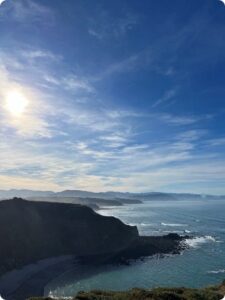
© Tom Benjamin Rummel
An advantageous aspect of my housing arrangement was the ability to review the apartment and complete the contractual formalities online prior to my arrival in Bilbao. This ensured a good transition before reaching my destination. Fortunately, my flatmates were predominantly Spanish speakers, affording me an ideal environment to practice and enhance my language skills within the rooms of my residence.
Financially, I received the Erasmus fee along with the minimum Spanish salary paid for my internship. In terms of living expenses, Bilbao’s cost of living equal my experiences in Aachen. But social outings are more economical, with soft drinks, beer, and wine averaging around 2€ per drink. Additionally, the culinary delights of the region (Pintxos, small tapas on bread) range from 2 to 3 euros per piece.
The public transportation system, particularly the metro, benefits from state subsidies, making it exceptionally affordable. A standard metro fare amounts to approximately 50 cents, contributing to the overall accessibility of transportation within the city.
- Everday life / the internship
Managing my everyday life during my Erasmus internship at FEV Consulting in Bilbao was a dynamic experience. Throughout the workweek, my days were filled with a good workload, leaving little time for activities beyond sports and cooking post-work.
While the option of working from home was available, it was relatively uncommon. I chose to commute to the office daily, a practice that proved to be beneficial. Leaving my laptop at the office made a clear separation between work and personal life, allowing me to disconnect at home without work-related considerations. This setup also provided flexibility for post-work engagements, as I carried no bag after work.
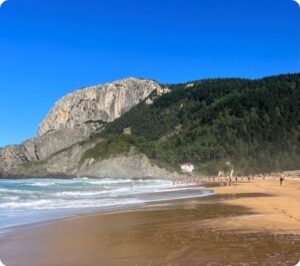
© Tom Benjamin Rummel
The standard working hours spanned from 8:30 to 18:30, including a long lunch break lasting an hour or sometimes even more. Colleagues, including myself, brought their own meals, creating a communal atmosphere during shared lunches and occasional ping pong matches.
Professionally, this period was pivotal as I undertook increased responsibilities within the company, starting with the management of my own small-scale project. English served as the primary working language, contributing to a cohesive and collaborative environment.
The office, characterized by an average age of around 28, has a cohesive and homogeneous team with shared interests. Social activities played a significant role, with a weekly soccer match against other local companies and Friday afternoons often concluding work a bit earlier. This allowed the team to go out into the lively streets of Bilbao, fostering the relations beyond the activities of the workplace.
- Free time/tips
Leveraging free time in Bilbao was an awesome exploration, as the city offered diverse options throughout the week, each drawing a varied crowd of locals spanning all age groups.
Going into different restaurants and locales became a personal priority whenever time allowed, though the city’s richness proved too big to conquer fully, even in its seemingly “small” boundaries.
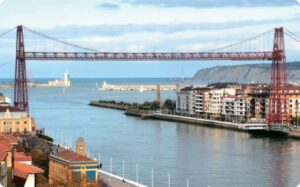
© Tom Benjamin Rummel
Three standout memories summarize my time in Spain. Foremost among them was the exploration of the seaside. The Atlantic coast unfolded a breathtaking panorama with expansive beaches, rough cliffs, and scenic paths for hikes or runs. The autumn weather allowed for enjoyable beach days, easily accessible within 30 minutes from the city center via the metro, costing just 50 cents. The surrounding regions revealed more treasures, showcasing diverse beaches and natural habitats.
On the opposite side of Bilbao lay the mountains, offering beautiful hikes with stunning views. Noteworthy expeditions included a 20 km hike to Gorbea in November and a spontaneous walk to Pagassari, a mountain right next to Bilbao. The accessibility of the countryside was evident as I strolled directly from my apartment, exemplifying the accessibility of nature next to urban living. Every favorable weekend weather was used by me to explore new surroundings, still leaving plenty of unexplored spots for future visits.
December presented an opportunity to make use of national holidays in Spain. A fellow intern and I used this chance to embark on a five-day adventure to Barcelona. The trip, undertaken by bus, a common mode of transportation in Spain, was a seven-hour journey.
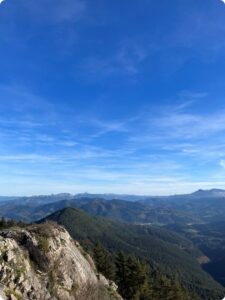
© Tom Benjamin Rummel
Barcelona welcomed us with pleasant weather and some Christmas markets, making the experience an unforgettable highlight of the whole season.
- Conclusion
Reflecting on my Erasmus internship at FEV Consulting in Bilbao, the experience surpassed my expectations in various ways. The seamless application process
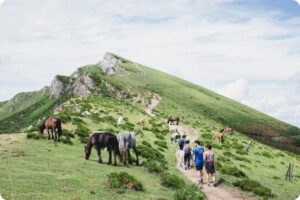
© Tom Benjamin Rummel
, coupled with the early acceptance, allowed me to embark on this adventure well-prepared and with anticipation. Living in Bilbao proved to be important for professional growth and personal enrichment. The daily routine, centered around a dynamic work environment, was complemented by the vibrant and diverse offerings of the city. The accommodating living situation, with engaging flat mates and reasonable living costs, added to the overall positive experience.
Professionally, the internship provided invaluable opportunities. From managing my first project to enhanced responsibilities, the exposure and guidance received significantly contributed to my professional development. The language-intensive work environment in English and the cohesive team dynamics created an atmosphere for learning and collaboration.
Beyond the workplace, Bilbao offered a rich diversity of experiences. Exploring the city’s culinary delights, embracing the natural beauty of the Atlantic coast and nearby mountains, and seizing opportunities for travel, particularly to Barcelona, added memorable dimensions to my time in Spain.
In conclusion, my Erasmus internship in Bilbao was a holistic journey encompassing professional growth, cultural immersion, and personal exploration. The memories stay, both within the workplace and beyond, will undoubtedly remain an important part of my academic and professional journey. As I look back, I am grateful for the experiences gained and the connections made, eagerly anticipating the chance of returning one day to continue the exploration of this region.
Internship in the field of refugee aid in Turkey
- Theology and Global Development Ma.
- Turkey, Izmir
- İmece İnisiyatifi Derneği
- 08/2023 – 01/2024
- Application / Finding an internship
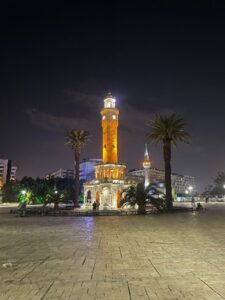
© Ida Helfensdörfer
The clock tower, the symbol of Izmir
After I had already done an Erasmus+ internship in Istanbul right after completing my Bachelor’s but had to break it off after a short time due to the Covid pandemic, I decided at the end of 2022, shortly before the end of my Master’s degree, to take advantage of the opportunity again and do another Erasmus+ internship in Turkey. I initially planned to go to Istanbul again. During my first internship abroad, I worked in a German-Turkish kindergarten. This time I wanted to work in the area of refugee aid because I had already gained a lot of experience in this area in Germany and I was interested in how refugees live in Turkey and what support offers there are for them. So I first applied to a few non-governmental organisations in Istanbul that were active in this area. However, many of the organisations did not even respond to my application and I was ultimately unsuccessful. So I decided not to limit myself to Istanbul but also to look for organisations in other Turkish cities. During my internet research, I quickly found what I was looking for and came across an NGO in Izmir called “İmece İnisiyatifi Derneği”, which I had already noticed a few years ago when I was looking for an internship position. I applied and received a response the next day with information about the organisation’s volunteer program. About a week later, I had a casual introductory conversation with the volunteer coordinator and I received a confirmation for my internship. Now all I had to do was apply for Erasmus funding, which was not particularly complicated. Everything was settled in April 2023 so that I could start my trip in August 2023.
- Accommodation & Living expenses
Unfortunately, I was not that lucky with my accommodation at the beginning. The volunteer coordinator at the organisation I worked for told me that there was a special house for the volunteers where I could rent a room. Unfortunately, even when I asked, I did not get any really precise information about the apartment. But since I had not found an alternative before leaving, I said yes first. Unfortunately, when I got there it turned out that the apartment was not as it had been described to me before and that I as a woman should have lived there alone with a male colleague. I did not feel comfortable with this living situation and therefore decided to look for other accommodation. I moved between different apartments several times until I finally ended up in a nice three-person shared apartment with two Pakistani girls who were doing a semester abroad in Turkey.
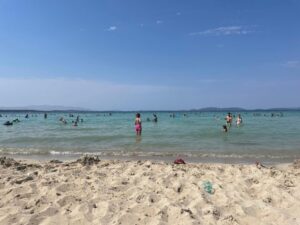
© Ida Helfensdörfer
Ilıca Beach in Çeşme
I got in touch with the girls through a WhatsApp group for exchange students in Izmir. I got along really well with my new flatmates right from the start and I was happy to have finally found a shared apartment where I felt comfortable. We rented an apartment in Karantina district, where I shared a room with one of the girls. I paid the equivalent of around €80 for the rent + additional costs (which are not very high in Turkey). This was a very reasonable price for such an apartment, thanks to my flatmate, who was able to negotiate the rent down quite a bit with the landlord. However, it is generally quite possible to find a room for €200 or less in Izmir. Negotiating is certainly always a good idea in Turkey. The other costs of living are of course lower in Turkey compared to Germany, although also Europeans feel the extremely high inflation that Turkey is currently struggling with. Nevertheless, I was able to live very well there on my Erasmus scholarship.
- Everyday life / The internship
The organisation where I completed my internship has various projects for refugees and focuses its work primarily on women and children. Initially, I was able to work for a few weeks on an educational project for refugee children from Syria. Every morning my team and I went to a village where many refugee families had settled. The organisation had placed a large bus there, which had been converted into a classroom inside so that classes could take place there. The aim of the project was to provide the child
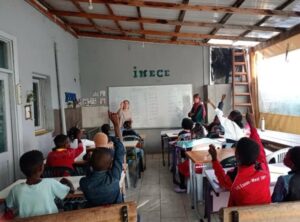
© Ida Helfensdörfer
Maths class with the kids
ren with basic education and, above all, the basics of the Turkish language in order to prepare them for attending a regular Turkish school. My job was usually to play games or do other kinds of activities with the children outside the bus. After class, we occasionally visited individual families at home to strengthen relationships with them and talk to them about their current situation and their needs.
Later I spent most of the time working on another educational project for refugee children from African countries. Most of the children came from Congo or Angola and had fled to Turkey with their families. However, they live there without documents and therefore have no access to rights, health care and education. Therefore, the organisation has created a community center in Basmane district where the children live. There the children are taught, receive a hot lunch and can simply be children. Together with a permanent teacher and other volunteers, I was responsible for teaching the children. There are two classes at school – one for adolescents in the morning and one for younger children in the afternoon. I taught English, geography and maths to both groups. I also helped with handing out lunch every day. Of course, games, dancing, small celebrations and other activities that we organised together for the children were an important element from time to time. Sometimes just listening to a child or holding them in your arms was enough to make them feel seen and understood.
- Free time / Tips
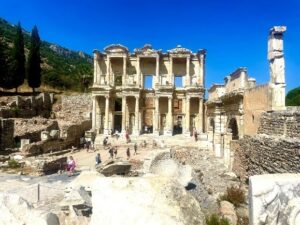
© Ida Helfensdörfer
The Ancient City of Ephesus
Just a few weeks after my arrival in Izmir, I already had a large number of friends there. Some of my friends I met through my internship, including some volunteers from many different countries around the world who worked with us on the projects for a few weeks. I also had my flatmates, who in turn put me in touch with their friends. I also went to an African church every Sunday, which I found through my African colleagues. There, too, I quickly got to know people from many different countries. So in Izmir I was well integrated into a multicultural community. That way I almost never spent my evenings and weekends alone. There was always someone to take me somewhere – whether it was for a Turkish breakfast, bowling, shopping or just a walk by the sea. So I hardly found time to travel to other parts of Turkey, but I didn’t find that to be a bad thing. There was still enough time for some trips to the surrounding area of Izmir. The ancient city of Ephesus, the Çeşme peninsula and the fishing town of Foça are certainly worth seeing. Of course, there are also some sights within the city of Izmir, although for me Izmir is not primarily a place for great sightseeing. For me, it’s more of a place where you can sit by the sea with friends, shop at the bazaar, explore the different parts of the city in a relaxed manner and also use the ferry as a means of transport for that.
- Conclusion
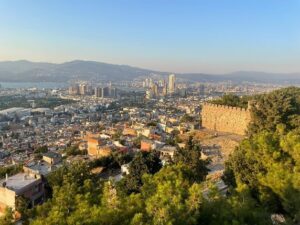
© Ida Helfensdörfer
View of Izmir from Kadifekale Mountain
In fact, I would have loved to extend my internship by another six months. Ultimately, it was due to a lack of communication from the organisation that I didn’t get a residence permit for Turkey and had to pack my bags after half a year. So sometimes I would have been desirable to have a better communication with the responsible people in the organisation. Nevertheless, İmece does great and important work for refugee children in Turkey who would otherwise lack any prospects in life. As an intern, I was quickly able to take on responsibility and realised that I could make an important contribution to the education of these children.
All in all, I can only say that the time I was allowed to spend in Izmir was the best time of my life. I can only encourage anyone who is thinking about going abroad to do so. In any case, you will grow beyond yourself and gain experiences that will shape you for the rest of your life. I am particularly happy and grateful for all the great people I have met in this short time and who will hopefully remain a part of my life for a long time to come.
Internship in Madrid
- Political Science Ma.
- Spain, Madrid
- Goethe-Institut Madrid
- 09/2023 – 12/2023
- application process

© Dinah Schmidt
I started learning Spanish during my bachelor’s degree and had long planned to spend some time in Spain. In September 2022 I applied for the three-month internship in the cultural department of the Goethe-Institut Madrid. The online application consisted of my CV, a certificate of study, and a letter of reference from one of my professors/lecturers. In addition, i was required to answer a few questions about my previous experience, my interests, and my ideas. Then, in December, I received my acceptance on time as a Christmas present. Since then, I have been improving my Spanish skills with language courses and looking forward to my stay. In the summer of 2023, as the start of my internship approached, I started to prepare myself more intensively. Among other things, I studied the history of the city and the cultural offerings and scenes. Then it all started in mid-August! I combined the outward journey with a road trip through Belgium, France, and Spain. Over three weeks, we explored the coastal strip from Bordeaux to Llanes and then travelled through the mountains to Madrid. The traffic on Madrid’s motorways is a definite turn-off!!!
- Accommodation and Living Expenses
I knew from other reports that it would be very difficult to find accommodation and that I would have to be careful not to get screwed. As I didn’t have time to travel a few weeks before the start of the internship to look for a flat on the spot (or preferred to spend the time travelling), I used the Spotahome app. This gave me the certainty that the flat definitely existed and the deposit was only transferred to the landlord after I had given feedback that the flat looked as advertised.
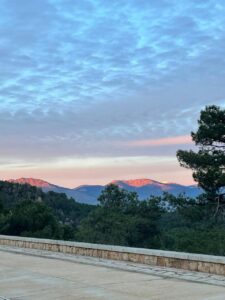
© Dinah Schmidt
Of course, this security also came at a cost. In hindsight, I would recommend looking for accommodation locally rather than from Germany – but it was important for me to have a firm commitment for a room before the start of the internship. I lived in a shared flat with four people who were all only in Madrid for a few months to study. The flat was on the edge of a very nice neighbourhood (Salamanca) on a large roundabout – fortunately in the back building. My room was very small but nicely furnished and had a window. The flat only had a small kitchen, was very noisy and all in all was not in very good condition. The rent was 570 euros per month (!!!) which is very high for this property compared to German rents. Especially when you consider the difference in income between Germany and Spain. In the end, the decisive factor for me was that the Goethe-Institut was easy to reach from the flat. It was just under 25 minutes on foot and a quarter of an hour by metro without changing trains. The cost of living was not much lower than in Germany, only bar and restaurant meals were slightly cheaper.
- Everyday life/the internship
The working hours at the institute were Monday to Friday from 9:00 to 18:00. As part of the cultural work, events were regularly scheduled in the evening, which provided a great deal of flexibility in terms of time on site. On the one hand, the internship involved several continuous tasks and,
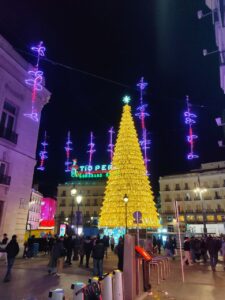
© Dinah Schmidt
on the other, offered me a wide range of opportunities to get involved in events. One regular task was to fill the Goethe-website-programme with content and revise it. I also provided support in the areas of communication and social media presence. This included creating events, application posts and reminders, but also conducting interviews with various artists/residents. Another very enjoyable and exciting task was looking after the residents and the institute’s guest flats. I had an overview of when an artist was arriving and departing and was able to welcome them. As a result, I got to know many artists (dance, theatre, cinema, sound, painting, …), theorists and researchers from all over the world during my internship. As part of the FLIPAS-project, workshops on a wide range of topics were made possible through the cooperation of several European cultural institutes in Madrid, cultural institutions and social organisations. These workshops took place in social organisations, museums or other institutes and focused on enabling young people in difficult circumstances to take part in cultural projects, establish contact with international artists, get them excited about the topics and create a great group experience together. As part of this project, I was able to take part in almost all the workshops and assist with translating and documenting them. This allowed me to get to know cultural and social centres, visit theatres and museums in Madrid’s city centre and the surrounding area, and network with a wide variety of people involved in cultural work.
- Free time & tips
The weather in Madrid was wonderful. We could sit outside until the beginning/mid-November and even in winter it was light until 6 p.m. and most days were characterised by bright sunshine. People’s rhythms start and end later than in Germany. The attitude to life is more relaxed and people get together longer in the evening and eat later and more extensively. I can definitely recommend the tapas culture. At the institute, six of us shared an office and were able to spend our breaks together and explore the city. We visited the large and smaller museums in Madrid and took the opportunity to visit some theatres and information events on various topics via the institute. The Reina Sofía Museum has a collection of recent Spanish art and exhibits documents from Spain’s history of protest – I was very impressed. I should not forget to mention the beautiful Retiro Park and the very picturesque and culturally interesting
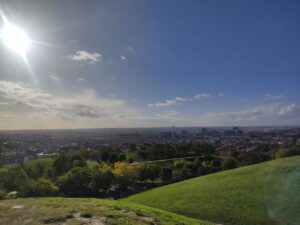
© Dinah Schmidt
neighbourhoods of Lavapiés, Malasaña and La Latina. Madrid never sleeps – In the evenings and at the weekend, I visited some of the countless beautiful bars and clubs. (Favourite bar here: La Venencia – a quaint pub with an interior from the last century, where the Republicans met during the Civil War, with good sherry and delicious tapas) On the long weekends, I went on a trip to Valencia with friends, hiked the mountain regions around Madrid (Navacerrada was very nice), visited the nearby city of Toledo and the historical memorial site “Valle de Cuelgamuros” (also highly recommended). I really liked the Tío Pío Park in the Vallecas neighbourhood for its beautiful views over the city and, of course, the views from the various rooftop bars.
- Conclusion
To summarise, I can definitely recommend an experience abroad in Madrid and an internship in the cultural department at the Goethe-Institut Madrid. I really enjoyed it and the tasks I was given enabled me to surpass myself and make lots of contacts in Madrid and Spain. This experience abroad has also made me want to take on more projects abroad in the future, especially in Spanish-speaking countries. Finally, I have grown very fond of the people I met in Madrid, and I look forward to maintaining these contacts.
Research Stay in San Sebastián
- Teaching and Research Logopedics M.Sc.
- Spain, Donostia-San Sebastián

© Anne-Kathrin Mahlke
- Basque Center on Brain, Cognition and Language (BCBL)
- 09/2023 – 12/2023
- Application / Finding an Internship
Finding the group and supervisor, and even deciding to do an Erasmus+ research stay abroad was a total stroke of luck. I knew that I wanted to look into young children’s language development in my master’s research project and had been searching for suitable research groups within Germany. By chance, another student who had just returned from her own Erasmus+ research stay at the BCBL in San Sebastián in Spain reported about it in a colloquium – and talked about doing exactly the kind of research I knew I wanted to do. Then it was just a question of being brave enough to send an e-mail to the leader of the group she had worked with, asking about the possibilities for a research internship. After sending my first e-mail, I did not hear anything back for over two weeks – and almost gave up on the whole idea. Only thanks to my partner’s relentless encouragement did I bring up the courage to send a reminder – and to this day I am deeply greatful for his engouragement! I heard back from the supervisor almost immediately, and she was very open to me visiting her group!
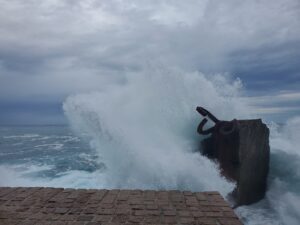
© Anne-Kathrin Mahlke
After agreeing on a time frame for my stay, extensive preparations began: we started discussing possible topics for my research project, which mostly meant a lot of paper reading on my side. I also asked one of my professors in Germany for his co-supervision, as this is required in my program. In parallel, I started the application process for the Erasmus+ support. After reading all the information on the application, this took time, but was fairly easy. I was lucky that all people involved – my supervisor in Spain, my supervisor in Germany, and the adminstrators involved – were extermely helpful and available for any questions or requirements I had.
- Accomodation & Living expenses
Although it is a smaller city, unfortunately, San Sebastián is one of the most expensive places to live in Spain, and finding accomodation is not easy. Single rooms in shared appartments can easily cost 400-600 € per month. Fortunately, my supervisor was able to connect me with a Guest House for visiting researchers, in which I not only found accomodation quickly, but which would also become the place where I found some of my closest friends during my stay. The high housing prices meant that basically my whole Erasmus+ funding went towards rent during my stay. Luckily, I had some additional funds saved, and the cost of food and everyday life in Spain is quite low.
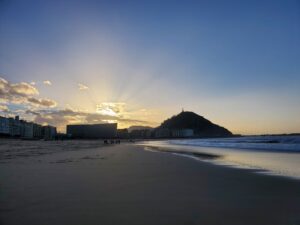
© Anne-Kathrin Mahlke
- Everyday life / The internship
As I had done a lot of theoretical preparation for my research project already in Germany, I was able to jump straight into work at the institute. Still, there was a lot to learn. I was assigned days on which I was required to help in the BabyLab, and in the first few weeks spent any free minute there in order to quickly get to know the different experiments and methodologies. Even though most families visiting the BabyLab spoke Spanish and/or Basque, and I am not fluent in either of these languages, I could quickly pick up many of the more technical tasks, or entertain the babies, for which language is not too necessary. Since I was conducting an EEG study, I also started learning the necessary data analysis methods. Between regular meetings, presentations, reading, writing, programming, and lab duties, I quickly fell into a busy, but extremely productive routine.
The group and my supervisor were great at welcoming me and including me in the proceedings at the institute. Since the BCBL is a small, close-knit community, many people came up to me, introduced themselves, and asked about my plans for the stay.
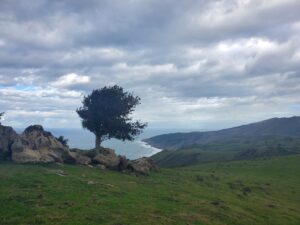
© Anne-Kathrin Mahlke
Interacting with so many people who are all interested in the same topics I am interested in, and hearing about all their amazing research was probably one of the greatest experiences during my stay at the BCBL.
My supervisor made sure to give me a lot of freedom and simulteaneously providing enough guidance for me to successfully progress through my project. I also received a lot of support from other members of the group, and have formed some great friendships. Since the group is rather new and mostly made up of PhD students and young postdocs, we were all in similar situations and could help each other, which created a great atmosphere. I am very much looking forward to watching all of them grow throughout their academic career and to meeting them at many conferences to come!
- Free time / tips
Although still relatively unknown, the Basque Country is an amazingly beautiful place with a very high quality of
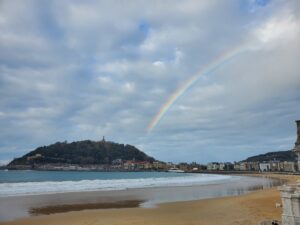
© Anne-Kathrin Mahlke
life. This is especially true for San Sebastián. Donostia (as it is called in the Basque language) has one of the highest densities of Michelin stars per inhabitant in the world, and it is hard to find a bad restaurant in the city. The culinary speciality are Pintxos, small bites of food that are usually taken with a glass of local wine. San Sebastián also provides a lively cultural scene, with exhibitions, concerts, sports events, and much more. Some of the highlights during my time there were a rowing regatta which basically became a big festival, and the San Sebastián Film Festival. A big international community provides cultural diversity, while at the same time the Basque culture and language are ubiquitous and greatly influence everyday life. Furthermore, San Sebastián has great public infratstructure with a well working and cheap public transport network and quite well connected bike lanes (even though the mountains make these a tiny bit less attractive).
For me, probably one of the most enjoyable aspects of San Sebastián and the Basque Country are its landscapes. With the atlantic ocean on one side and impressive mountains on the other side, the area provides endless opportunities for outdoor activities. Hiking, surfing, climbing, swimming – even though I only managed to do a fraction of the things I had planned to do, I enjoyed every single outing.
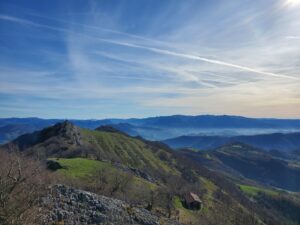
© Anne-Kathrin Mahlke
Even just hearing the waves and seeing the mountains on the horizon on my way to work made every day life a little bit better. One of my favourite things to do when stressed was to walk down from my appartment to the coast and watch the waves for a little while. Now, back to living in Cologne, I deeply miss the sea, the mountains, and the fresh air they bring.
- Conclusion
All in all, my stay in San Sebastián and at the BCBL was an extremely valuable experience. Even though it came about almost by chance, I now see it as one of the most important times during my studies, with regards to both my personal and my academic development, to the friendships and connections I have made, and to the impact it has had on my plans for my future. It is a place I will definitely return to – for holidays or even for a longer stay – and I hope to keep the connections I have made alive. I am also very happy to have helped create and uphold the connection between the BCBL and the RWTH Aachen – as I am writing this, the next student is planning her stay there – and I hope that this will become a long standing and fruitful tradition.


